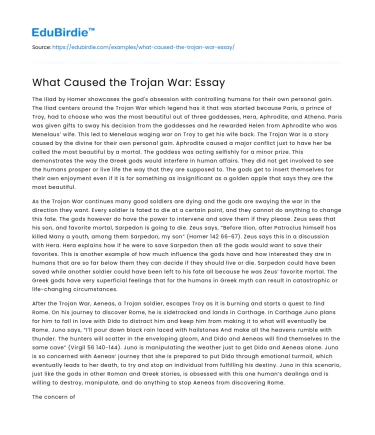The Iliad by Homer showcases the god's obsession with controlling humans for their own personal gain. The Iliad centers around the Trojan War which legend has it that was started because Paris, a prince of Troy, had to choose who was the most beautiful out of three goddesses, Hera, Aphrodite, and Athena. Paris was given gifts to sway his decision from the goddesses and he rewarded Helen from Aphrodite who was Menelaus’ wife. This led to Menelaus waging war on Troy to get his wife back. The Trojan War is a story caused by the divine for their own personal gain. Aphrodite caused a major conflict just to have her be called the most beautiful by a mortal. The goddess was acting selfishly for a minor prize. This demonstrates the way the Greek gods would interfere in human affairs. They did not get involved to see the humans prosper or live life the way that they are supposed to. The gods get to insert themselves for their own enjoyment even if it is for something as insignificant as a golden apple that says they are the most beautiful.
As the Trojan War continues many good soldiers are dying and the gods are swaying the war in the direction they want. Every soldier is fated to die at a certain point, and they cannot do anything to change this fate. The gods however do have the power to intervene and save them if they please. Zeus sees that his son, and favorite mortal, Sarpedon is going to die. Zeus says, “Before Ilion, after Patroclus himself has killed Many a youth, among them Sarpedon, my son” (Homer 142 66-67). Zeus says this in a discussion with Hera. Hera explains how if he were to save Sarpedon then all the gods would want to save their favorites. This is another example of how much influence the gods have and how interested they are in humans that are so far below them they can decide if they should live or die. Sarpedon could have been saved while another soldier could have been left to his fate all because he was Zeus’ favorite mortal. The Greek gods have very superficial feelings that for the humans in Greek myth can result in catastrophic or life-changing circumstances.
Save your time!
We can take care of your essay
- Proper editing and formatting
- Free revision, title page, and bibliography
- Flexible prices and money-back guarantee
After the Trojan War, Aeneas, a Trojan soldier, escapes Troy as it is burning and starts a quest to find Rome. On his journey to discover Rome, he is sidetracked and lands in Carthage. In Carthage Juno plans for him to fall in love with Dido to distract him and keep him from making it to what will eventually be Rome. Juno says, “I’ll pour down black rain laced with hailstones And make all the heavens rumble with thunder. The hunters will scatter in the enveloping gloom, And Dido and Aeneas will find themselves In the same cave” (Virgil 56 140-144). Juno is manipulating the weather just to get Dido and Aeneas alone. Juno is so concerned with Aeneas’ journey that she is prepared to put Dido through emotional turmoil, which eventually leads to her death, to try and stop an individual from fulfilling his destiny. Juno in this scenario, just like the gods in other Roman and Greek stories, is obsessed with this one human’s dealings and is willing to destroy, manipulate, and do anything to stop Aeneas from discovering Rome.
The concern of the individual like the Greek and Roman gods is not as prevalent with the Judeo-Christian God. This god only interacts with individuals when it is to discuss or to spread a message to His people. It is not for God’s personal gain it is for the group to live a certain way. Early in the Bible, in Genesis, God creates a covenant with Abram. The covenant states that God has chosen Abram, whose name changes to Abraham, to be the father of his chosen people and that He would give Abraham many descendants. Genesis, says, “He took him outside and said: Look up at the sky and count the stars if you can be. Just so, he added, will your descendants be” (Genesis 15:5). God promises that he will give Abraham many descendants, something that Abraham wanted very badly, and Abraham will lead these people to be God’s chosen group. God is communicating with Abraham directly for the benefit of humans, specifically the Israelites. The contact with the divine does not have a personal agenda.






 Stuck on your essay?
Stuck on your essay?

